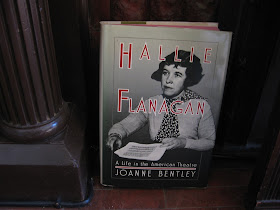Now they have a new album out, The Hazards of Love, which can't be evaluated in quite the same way as their previous ones. Instead of being a collection of individual pop songs, it is a full-fledged, hour-long rock opera. The ambition of this project excited me, but after listening to the album start-to-finish twice, and a few of the songs more times than that, I don't think it all panned out.
As long as the Decemberists have been doing their unique thing, there've been people who've made fun of them for it. Back in 2005, if you wanted to mock the Decemberists, you'd point to "The Mariner's Revenge Song." Who did these crazy kids think they were--who ever heard of an indie-rock band that performed ten-minute-long sea chanteys about being swallowed by a whale? But I've always thought that "The Mariner's Revenge" is great fun, and furthermore, compared to The Hazards of Love, it gets right a lot of what the new album gets wrong. To wit:
- Clarity of storytelling: My biggest problem with Hazards of Love is that it's impossible to make sense of the story. And yet, before this album, the Decemberists were always great storytellers-in-song. Though the plot of "Mariner's Revenge" may be unrealistic, it's never hard to follow: someone who listens to the song once will be able to easily recount the whole story. Hazards of Love (which, granted, is six times longer than "Mariner's Revenge") is just muddled. For instance, the heroine becomes pregnant, but it's never clear whether she delivers the baby or not. Characters move in and out of the plot confusingly.
- Pacing, suspense: Because the plot of Hazards of Love is so hard to figure out, it feels like a shaggy-dog story ("And then this happened... And then this happened") rather than something that builds to a climax. And as I implied above, it's never clear how much time has elapsed over the course of the story. Contrast this with the way that "The Mariner's Revenge" jumps over a span of fifteen years in a deft, clever, and clear way: "It took me fifteen years / To swallow all my tears / Among the urchins in the street / Until a priory / Took pity and hired me / To keep their vestry nice and neat." (This might be my all-time favorite Decemberists lyric. Just wanted to share it with you.)
- Matching of instrumentation and lyrics: Many Decemberists songs are cleverly arranged in a way that supports the lyrics. Their sea-chanteys use sea-chantey instruments (lots of accordion), while "On the Bus Mall," a song about teenage runaways in Portland, features a contemporary indie-rock sound, with a silvery guitar that reminds me of Portland's drizzle. However, The Hazards of Love often feels mismatched. At one point, there is a short instrumental track titled "The Queen's Approach." The Queen is one of the villains of the piece, a powerful and dangerous woman with a fierce rock voice (provided by Shara Worden). But "Approach" is a meandering little banjo ditty that conveys nothing about her personality. Meanwhile, the moment where the sweet and innocent Margaret runs away to the forest is accompanied by the loudest, most grinding electric guitars on the whole album. As Colin Meloy shouts over top, "Our heroine withdraws... to the TAIGA!" it seems so much like a parody of self-important rock music that I want to either laugh or cringe.
- Intentional vs. unintentional humor: I've laughed at Decemberists songs before, but usually I could tell that they wanted me to do so. Back to "Mariner's Revenge": it's a song about two people who've been swallowed by a whale, and the band knows that this is preposterous, and cracks jokes: "Its ribs are ceiling beams / Its guts are carpeting / I guess we have some time to kill." The Decemberists told tall tales, but with insouciance and vigor. The Hazards of Love is much more earnest, however--the lyrics are more self-consciously archaic than ever, and the music more self-consciously "rocks." It is telling that the album's catchiest tune, and only single, is "The Rake's Song," which is a piece of insouciant black comedy--unlike the rest of the album.
- Style of music: This is more of a personal thing than my other complaints, but I'm just not really a fan of what the reviews are calling "prog-rock" and what I always think of as Weird Music That My Dad Liked in the '70s and Still Tries to Play on Road Trips. And yet, that seems to be the dominant musical mode of Hazards of Love. The parts of the album I like best, though, are the ones that don't employ that style, e.g. the folk-country ballad "The Hazards of Love 4." Though perhaps the last song of a big rock opera ought to be more explosive, it's a nice, gentle piece of music on its own. And my favorite moment on the album comes in the chorus of the song "Annan Water," where everything drops out of the mix but a lone organ and some echoing back-up vocals. A beautiful effect, especially in contrast to the overly aggressive prog-rock that surrounds it.




